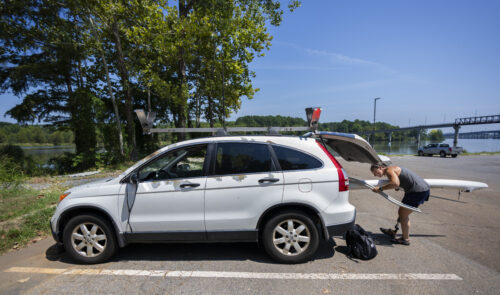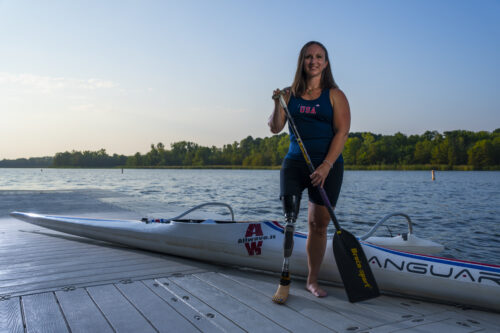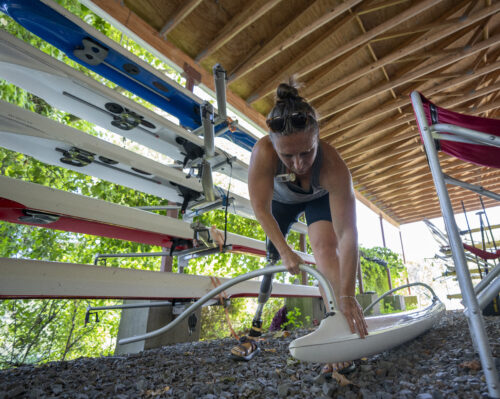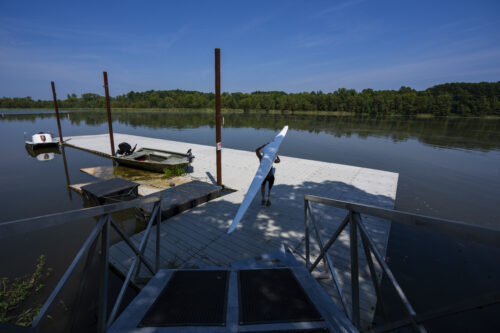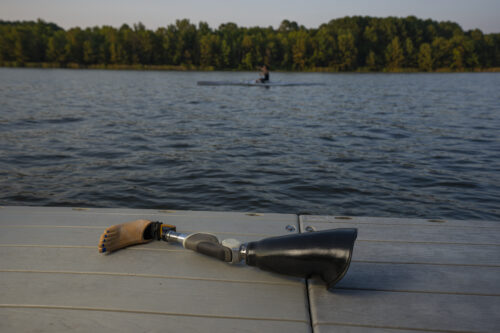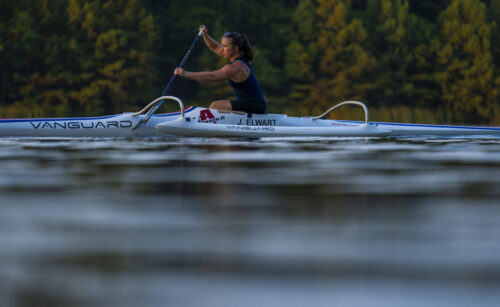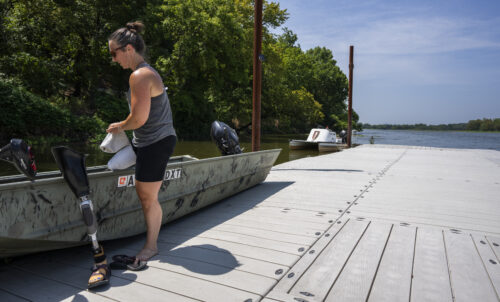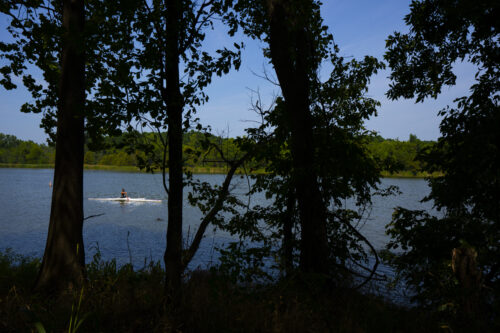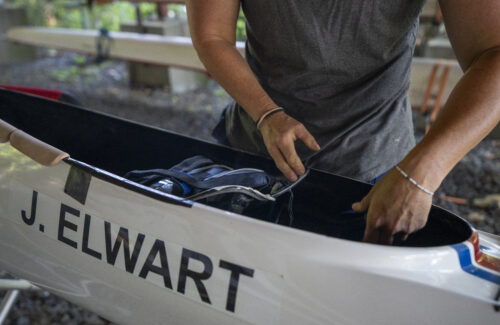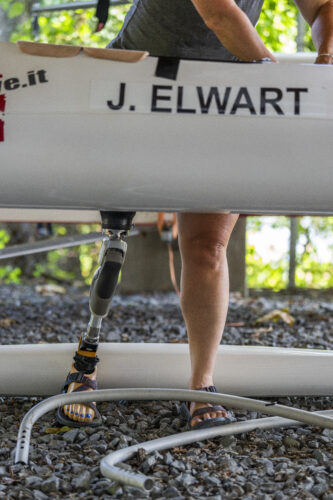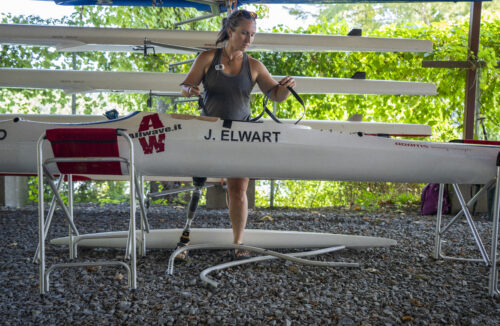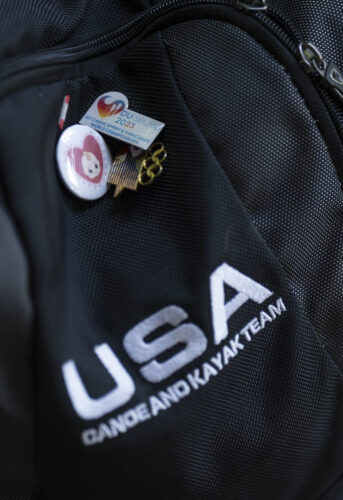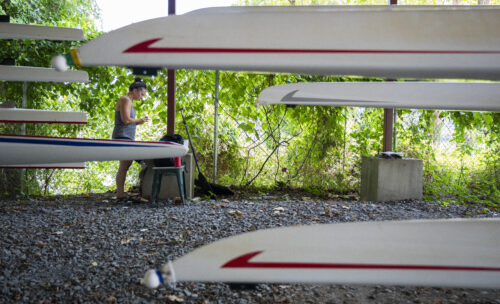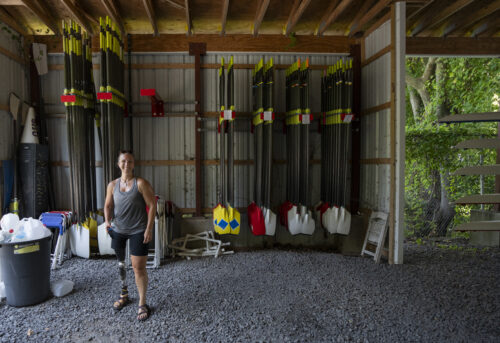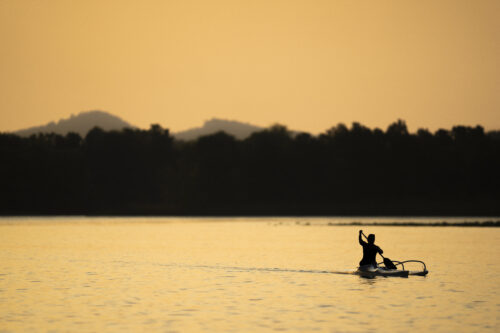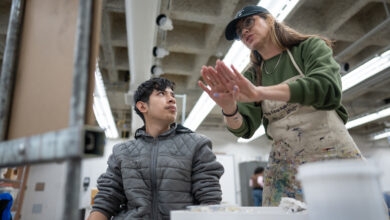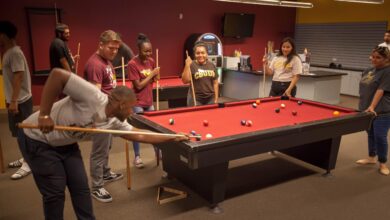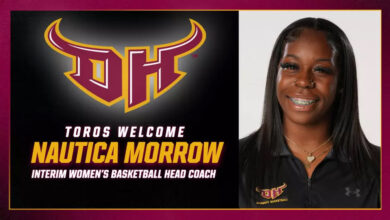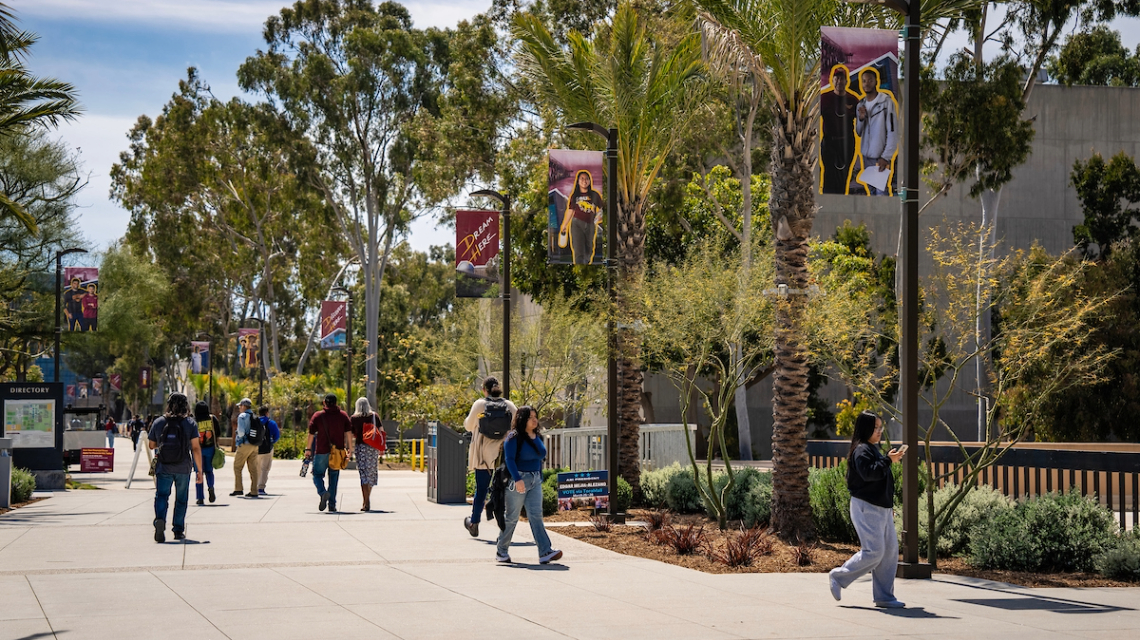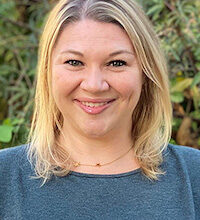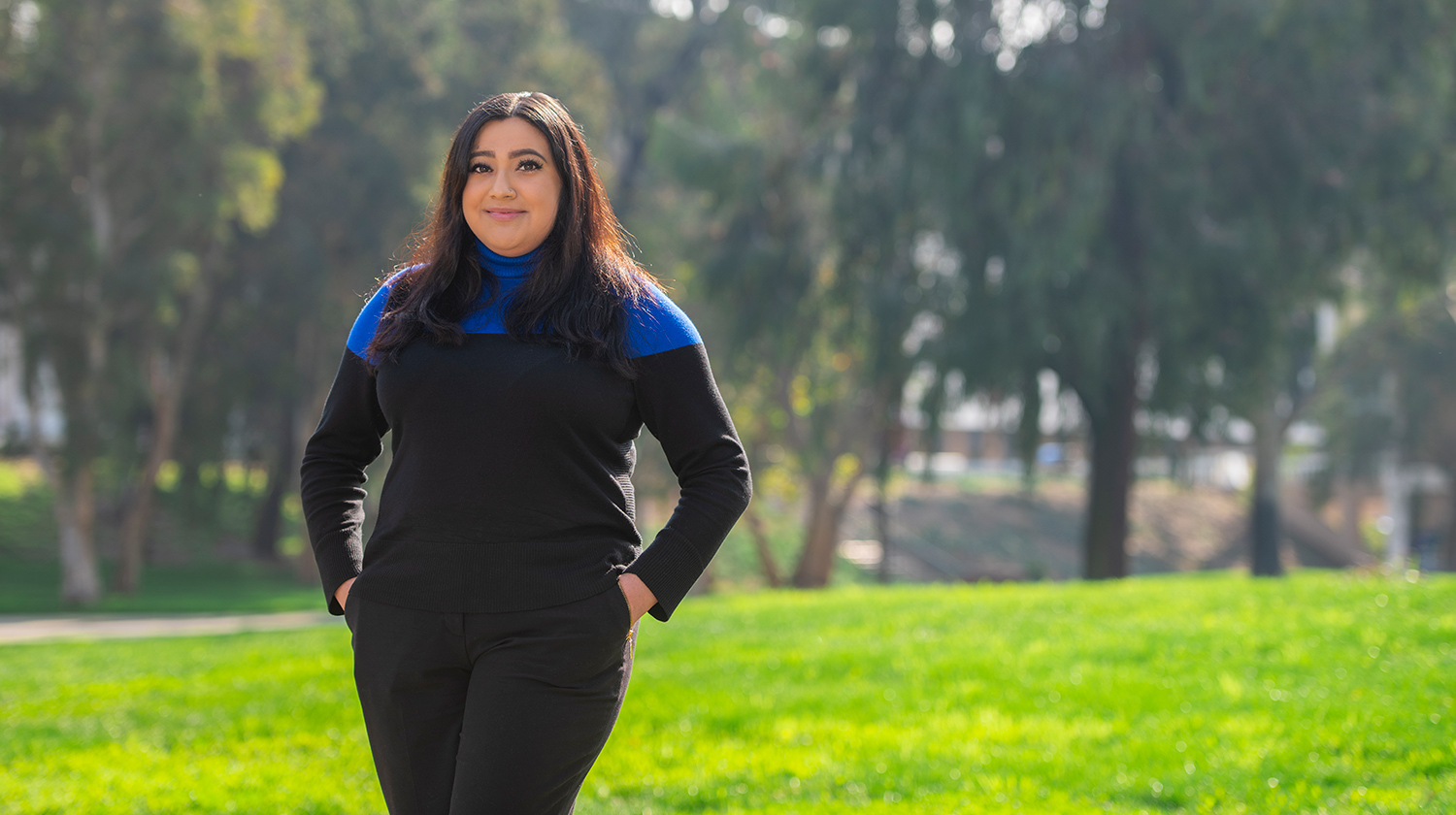Some 4,400 athletes from 168 delegations joined the Parade of Nations in the Place de la Concorde on Aug. 28 to mark the opening ceremony of the Paris 2024 Paralympic Games, and a proud graduate of CSUDH’s certificate program in orthotics and prosthetics walked among them.
Para canoeist Jillian Elwart, 41, will make her Paralympic debut at the Vaires-Sur-Marne Nautical Stadium on Sept. 6. Her event is a 200m sprint in a Va’a, an outrigger-style canoe fitted with a float on one side.
Elwart’s Paralympic journey began in 2014 after a whitewater expedition in Mexico introduced her to para canoe sprinting. Meeting Paralympian Kelly Allan, who represented the U.S. in Rio in 2016, gave her the push she needed to move from an enthusiastic novice to an international competitor.
As she gets ready to compete in Paris, Elwart says that representing her country is one of the greatest achievements of her life. “I’m becoming a part of history. Regardless of what I do with the rest of my life, there will always be a Jillian Elwart, Paris 2024. That feels so significant.”
Elwart made her international debut at the 2018 ICF Paracanoe World Championships in Portugal, finishing 6th in the Va’a Single 200m VL3 event and 14th in the Kayak Single 200m KL3 event. But she was competing without any professional guidance.
In 2022, she began training with coach Kaitlyn McElroy, a member of the U.S. National Team for sprint kayaking since 2014 and founder of the Overholser Kayak Club in Oklahoma City. Having a personal coach has improved her athleticism and motivation.
Working full time in landlocked Shreveport, Elwart commutes each week to Little Rock and Oklahoma City to get time on the water. “My training weeks are all over the place. I do my weight training at home in Shreveport, and then I travel for water workouts,” she says.
Fitting her training into a busy work schedule takes both dedication and flexibility. She travels for water workouts four or five days each week, fitting in ergometer, or ERG workouts, strength training, and Pilates at home in Shreveport. “It’s funny, but most of my rest days are just normal working days.”
Elwart’s 4th place finish at the 2023 World Championships in Duisburg, Germany, earned her a national qualification for Paris, and her time trials in Sacramento this March secured her the individual qualification to represent the U.S. in Paris.
“Jillian is my first truly national- or international-level athlete,” says McElroy. “I’ve coached younger kids at the national level and had some success, but Jillian is the first one who saw my potential as a coach and was willing to take a risk.”
‘Finding My Own Normal’
Elwart was born with proximal femoral focal deficiency, a rare, non-hereditary condition that affects one in 200,000 children. Her right leg was not fully formed at birth, causing one leg to be shorter than the other.
“My condition was a complete surprise to my parents,” says Elwart. “The ultrasounds during my mom’s pregnancy didn’t pick up any abnormalities.” She says she never felt excluded or limited by her disability growing up. “I’m very grateful that neither of my parents treated me any differently than any other child.”
In her developmental years, Elwart underwent several reconstructive surgeries—including a foot amputation, knee fusion surgery, growth plates to balance her mechanical and anatomical needs centers, an amputation above the knee, and a partial amputation on her right hand—to determine what would be most appropriate and functional for her.
“It was just part of life,” says Elwart. “I never saw myself as different. I might be a little slower here and there, but I never felt that there was anything that I couldn’t do. It was just about being adaptive and finding what best suited me.”
A Proud Toro
Elwart graduated from the University of Arkansas with a degree in anthropology. She had always been fascinated by human evolution and hoped to study ancient cultures. But the birth of her daughter Abigail during her sophomore year prompted her to rethink her post-graduation plans. She would need a stable career as a single mother, where she could be available for her daughter. That’s when she turned to the field of orthotics and prosthetics.
Among the handful of institutions offering orthotics and prosthetics certifications, Elwart narrowed her focus to CSUDH and Northwestern University in Chicago. The draw of West Coast weather was the deciding factor in bringing her to Carson in 2007 to complete her postgraduate certificate in prosthetics, and again in 2010 for her certificate in orthotics.
“My experience at CSUDH prepared me really well for my work in the field, both in overall knowledge and in hand skills,” says Elwart. “I couldn’t recommend it more highly for anyone interested in doing this kind of work.”
Then-lead orthotic instructor Kate Muller made an important impression on her as a student. “Kate was a gem of a person, and I think our orthotic cohort really bonded with her,” Elwart recalls. “You could just tell that she’s a very caring individual, and that resonated with all of us.”
Now a part-time lecturer, Muller says the O & P program at CSUDH distinguishes itself from others around the country for the reasons that Elwart mentioned—a strong clinical base with a strong focus on technical fabrication and hand skills.
Muller recalled that Elwart brought her life experience to her studies, and that being a prosthetic user meant she could understand the curriculum from both perspectives.
She also served as an important resource for her fellow students about how to apply the concepts presented in class. “She shared that empathy and that compassion and that point of view that I can’t teach because I’m not a user of prosthetic devices,” Muller says.
Giving Back at ‘The Shrine’
Elwart did her residencies in orthotics and prosthetics at Shriners Children’s Hospital in Shreveport, Louisiana, and still works there now with pediatric patients. Working at the same facility where she received care allows for an extra level of connection with her clients, who face a range of transitional challenges.
“I know what they’re going through, and I know what they can expect to see,” says Elwart. “Kids are so resilient. They just want to go out and have fun with their peers. There’s very little that actually holds them back from accomplishing their goals.”
One of the biggest challenges is saying goodbye to children and their families who have been a part of her life for years. “They age out at 18 or 19 and leave care. It’s like losing a friend.”
But there are compensations. Her favorite moment is seeing a child take that first step with a prosthetic leg. “The parents’ tears and frustration disappear as they realize that their child will have a normal life,” says Elwart. “It’s about finding the normal for you. Once you do that, life just happens.”
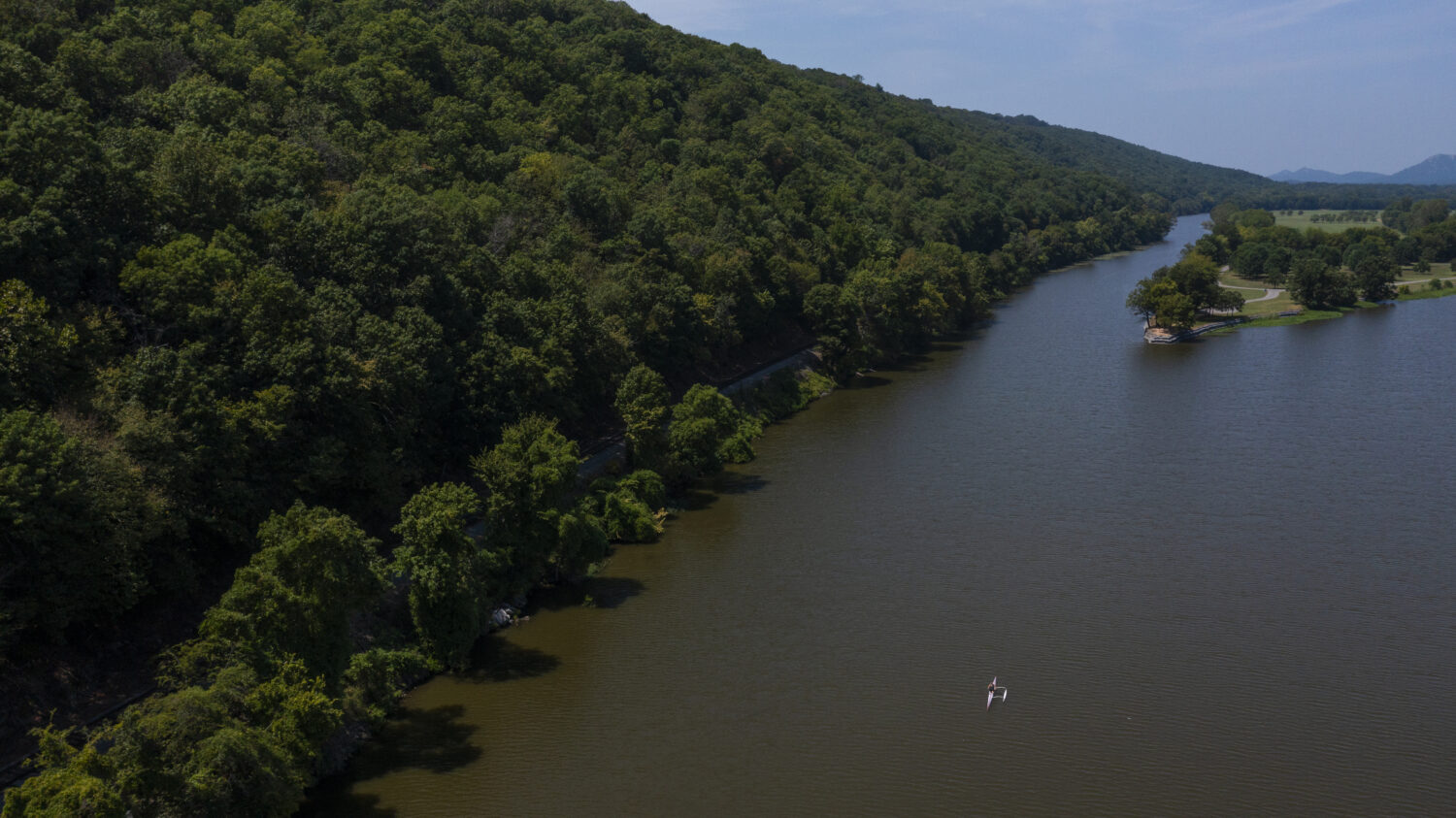
I never saw myself as different. I might be a little slower here and there, but I never felt that there was anything that I couldn’t do.
Jillian Elwart
Paris and Beyond
McElroy says most people don’t realize how competitive Paralympic canoeing is. There are fewer slots available than in other sports, and the 10 or 12 who make it to the Paralympics represent the top athletes in the world.
“You’re going to train two or three times a day for five or six days a week,” says McElroy. “Then you have to qualify, which is insanely difficult. The differential between going to the Paralympics and going home is measured in hundredths of a second.”
The challenges notwithstanding, McElroy says Elwart has the physical and mental toughness to win in Paris. “She came out of training earlier this month with two personal records, beating her previous times by more than two seconds. She’s in great shape, but so are the other competitors. I’m sure the final will come down to the wire.”
Elwart’s daughter Abigail, 21, has seen firsthand the hard work that went into earning a slot in Paris, not just in training but in the life they’ve shared together. “She had me when she was 19, and it’s been the two of us my whole life,” says Abigail
“I think it would be amazing if people knew how much work and dedication she’s put in, and how much of a toll that can take. To see her overcome everything she’s been through in life with such grace and gratitude is incredible.”
She adds that her last words to her mom before the competition will be something that her mom always told her at difficult moments. “I’ll tell her to do her best and forget the rest. Any time she dropped me off at school before an exam, or if I was nervous about anything, that’s what she always told me.”
What does Elwart make of her chances in Paris? “I feel like I’m building momentum in my athletic career,” she says. “Paris will be great, but I think Los Angeles in 2028 is where I’ll really shine. I’ve only been training with Kaitlyn for two years. There’s no telling where we can go on a six-year plan.”
But Los Angeles isn’t the only adventure on the horizon. For about four years, Elwart and her best friend have been planning a trip to Tanzania to climb 19,340-foot Mount Kilimanjaro. COVID derailed their plans in 2020, and Elwart’s training for the Paris games brought further delays. But the dream remains.
Elwart grew up never acknowledging any limits to what she could accomplish, and she continues to look for new peaks to conquer. Mount Kilimanjaro might well be the next.
